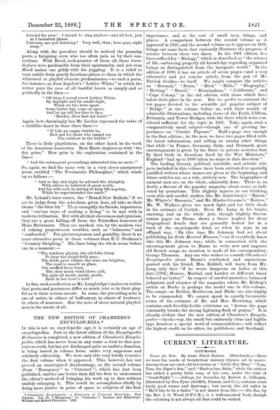THE NEW EDITION OF CHAMBERS'S ENCYCLOR2EDIA..* IF this is not
an encyclopEedic age, it is certainly an age of encyclopmdias. Just as the latest edition of the Encyclopxdia Britannica is completed, a new edition of Chambers's Encyclo- pwdia, which has never been in any sense a rival to that por- tentous work, but has yet discharged quite as useful a function, is being issued in volume form, under very sagacious and scholarly editorship. We were only able very briefly to notice the first volume when it appeared. This, however, has not proved an unmitigated disadvantage, as the second volume (from " Beaugency " to " Cataract "), which has just been published, enables one better than did the first to understand the editor's method of bringing his work up to date without unduly enlarging it. This result he accomplishes chiefly by doing more justice in point of space to subjects of the first • Chambers's Encyclopadia : a Dictionary of Universal linowledae. New Edition. Vol. II. (" Beangency " to "Cataract,") London and Edinburgh : William and Robert Chambers. 1888. importance, and at the cost of small men, things, and places. A comparison between the second volume as it appeared in 1861, and the second volume as it appears in 1888, brings out some facts that curiously illustrate the progress of science between these two dates. In the 1861 edition, five lines sufficed for "Biology," which is described as "the science of life, embracing properly all knowledge regarding organised beings as distinguished from the inorganic world." In the edition of 1888, it has an article of seven pages—and a very exhaustive and yet concise article, from the pen of Mr. Patrick Geddes—to itself. We might compare the articles on " Burmah," "Brain," "Bird," "Bible," "Biography," "Betting," "Brazil," "Birmingham," "California," and "Cape Colony," in the old edition, with those which have taken their place in the new. But we prefer to contrast the ten pages devoted to the scientific yet popular subject of " Bridge " in the volume before us, with their wealth of admirable illustrations, including views of the Forth, Clifton, Britannia, and Tower Bridges, with the three which were con- sidered sufficient for the topic in 1861. Take, again, such a comparatively small subject—though one of growing im- portance—as "Carrier Pigeons." Half-a-page was enough in the first edition ; in the new, we have two pages filled with the latest information, and telling us among other things that while "in France, Germany, Italy, and Denmark, great encouragement is given by the State to private societies that fly their birds in directions fixed by the War Ministers," England "had up to 1888 taken no steps in that direction."
The leading literary, political, scientific, and artistic sub- jects included in this volume have been entrusted to specially qualified writers whose names are given at the beginning, and whose articles are, as a rule, entirely new. The biographies of eminent men are, on the whole, admirably done. There is, no doubt, a flavour of the popular magazine about some, as indi- cated by quotations. This slightly injures, to our thinking, even able and careful studies, like Mr. Saintsbury's "Byron," Mr. Whyte's " Boccacio," and Mr. Hindes Groome's "Borrow." Mr. W. Wallace gives too much light and too little shade in his estimate of Carlyle. Even Mr. Lang, in his bright, amusing, and on the whole just, though slightly Steven- sonian paper on Burns, shows a brave neglect for those biographical details that are generally looked for in a work of the encyclopmdic kind, as when he says, in an offhand way, "By this time Mr. Johnson had set about publishing his Scots Musical Museum,"—as if everybody knew who this Mr. Johnson was ; while, in connection with the encouragement given to Burns to write new and improve old Scotch songs, no mention is made of his correspondent, George Thomson. Any one who wishes to consult Chambers's Encyclopxdia about Burns's celebrated and mysterious quarrel with his friend, Mrs. Riddell, will learn from Mr. Lang only that "if he wrote lampoons on ladies at this date [1794], Horace, Martial, and Landor at different times behaved no better." In respect of careful narrative, balanced judgment, and absence of the magazine odour, Mr. Kirkup's article on Burke is perhaps the model one in this volume. The essays on Berlioz, Beethoven, and Blake are also highly to be commended. We cannot speak in equally favourable terms of the estimate of Mr. and Mrs. Browning, which contains such forcibly-feeble criticisms as, "Across the page constantly breaks the strong lightning-flash of genius." It is already evident that the new edition of Chambers's Encyclo- paylia—(by-the-way, the small but eminently clear and legible type deserves a special word of commendation)—will reflect the highest credit on its editor, its publishers, and Scotland.










































 Previous page
Previous page